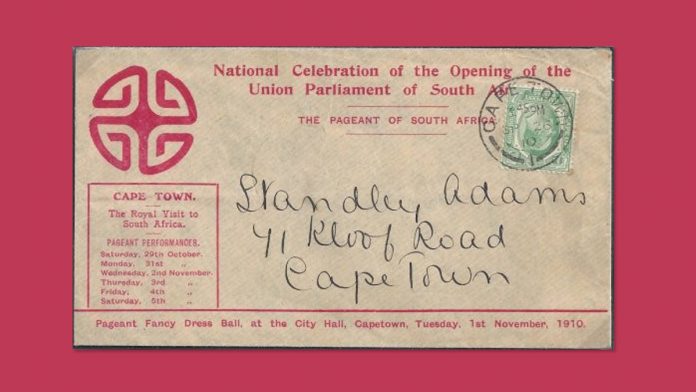By Gwynne Robins
What happens when a member of the public complains to us about a swastika? Do we ignore it? Investigate its meaning to the organisation displaying it, or go to the Human Rights Commission to complain about it?
The logo of the 1910 Pageant held at Cape Town to mark the opening of the first Parliament of the Union of South Africa was a swastika. Many prominent Jews sat on the pageant committees, including Rev Bender (Gardens Shul), the wife of advocate Morris Alexander MP (Board founder), Mrs Friedlander (Oranjia founder), the wife of former mayor Hyman Liberman, and Mark Cohen, principal of the Cape Town Hebrew Public School.
The organisers chose the swastika as the pageant emblem and official committee badge because its four arms denoted the four colonies: Cape of Good Hope, Natal, Orange Free State and Transvaal, and it was also a Sanskrit formula of good wishes and approbation used by the Egyptians and the Hindu.
We frequently get reports from people who have seen a swastika on an Indian handbag, on jewellery, painted on a fruit and vegetable truck, on a tile outside a neighbour’s house. We get reports of skinheads’ swastika tattoos, on flags, on motorcyclists’ leather jackets or school or university floats with people giving Nazi salutes.
However, not every swastika denotes antisemitism. It is even found carved into one of the stones in a Kfar Nahum synagogue near Tiberias dating to Roman times.
In the cases described above, the Cape SAJBD investigates carefully and often arranges tours of the Holocaust Centre to boost awareness.
In India, it is the universal and revered symbol of good luck and wellbeing — so if the handbag or jewellery is Indian or the truck belongs to an Indian company, the swastika holds no antisemitic significance whatsoever. The swastika tile outside a house is similar to a mezuzah.
We complain that it’s insensitive to display a swastika because of what it signifies to Jews, but it is not banned in South Africa as in Germany. We would be seen as insensitive, even entitled by our past suffering if we prevented religious Hindus from displaying their good luck symbol. They too had their suffering — 50 000 Hindus were killed in sectarian warfare in 1947 in India because the world had not learned the concept of ‘never again’. There are 550 000 Hindus in South Africa and 52 000 Jews, and Hindu rights to religious beliefs and opinions are equally protected in our constitution. Many South Africans might also be ignorant of what happened to the Jews 80 years ago, and what the swastika signifies to us.
An Indian scholar complained that the “Swastika or Svastika, the universal and most revered symbol of auspiciousness, good luck and wellbeing has been portrayed as the symbol of horror, hatred and racism by the Western world after World War II. World politics have brainwashed the new generation and created unnecessary hatred towards the Swastika by portraying it as the symbol of evil, demise, destruction and ruination, and kept the public aloof from the true meaning, significance and history of Swastika. Due to its misrepresentation, many… consider it today as a symbol of hate, terror and a reminder of the atrocities committed by Adolf Hitler and his Nazi Party. The swastika was not invented or designed by Hitler. He merely stole it from the most ancient human civilisations of the Vedic period and used it as the emblem of his party… and annihilated the significance of this most ancient symbol, respected as the sign of good luck, fortune and auspiciousness… The swastika is an ancient symbol of Vedic Aryans Of Aryavarta (India) that has brought luck and joy for centuries to all mankind globally and continues to do so in the present days. The symbol stands for truth, compassion, tolerance and happiness.”
He concludes the article with, “Hitler be damned, this is our sign since 6 000 years before Christ!”
The Board investigates all complaints carefully, as part of our role in monitoring and preventing antisemitism, while remembering that not every report of a swastika indicates antisemitism. It might just represent a religious symbol.


Cape SA Jewish Board of Deputies website: www.capesajbd.org, Instagram, and Facebook page.
• Published in the PDF edition of the June 2021 issue – Download here.
• Sign up for our newsletter and never miss another issue!
• Please support the Cape Jewish Chronicle with a voluntary Subscription. For payment info click here.
• Visit our Portal to the Jewish Community to see a list of all the Jewish organisations in Cape Town with links to their websites.
Follow the Chronicle: Facebook | Instagram | Twitter | LinkedIn











